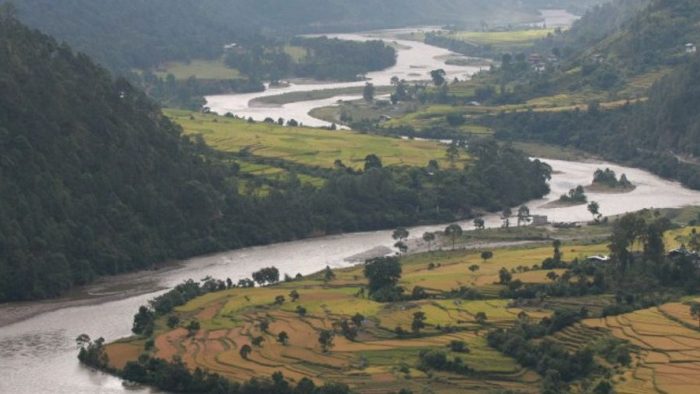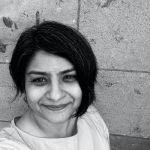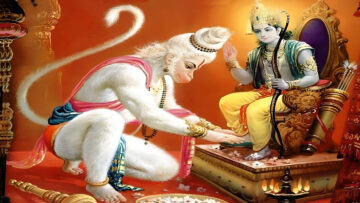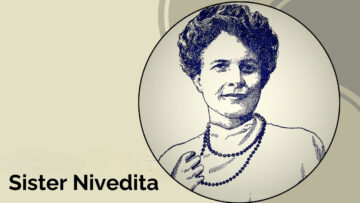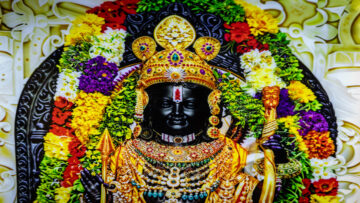Read part I.
“Have you also learned that secret from the river; that there is no such thing as time? That the river is everywhere at the same time, at the source and at the mouth, at the waterfall, at the ferry, at the current, in the ocean and in the mountains, everywhere and that the present only exists for it, not the shadow of the past nor the shadow of the future.” – Herman Hesse, Siddhartha.
Our personal inner journeys, as much as we would like to categorise them into neat boxes, are fragmented, splitting into minor or mighty tributaries, doubling back over themselves, looping around vast landscapes like the Brahmaputra in spate, and when they empty into the sea, we see that it is but the beginning all over again. When we begin to live this truth, it becomes hard to pinpoint an event and say ‘this is where I began’, or ‘this is where I am going to’, because we travel towards these outcomes in self discovery cumulatively, through many births, crossing many milestones that we did not recognise as such, long beyond the limits of our immediate awareness.
In this lifetime alone, I have been part of the ISKCON movement as a child, Bible study in my schools overseas and in India, the Sri Satya Sai organisation in college arming me with a Bachelor’s degree in Indian philosophy alongside English Literature and Economics, and a diploma in Indian culture and spirituality. I am now a student of Vipassana where I embrace sparseness.
My reading has leaned towards Vedic texts that my parents and grandparents house was always strewn with, books on Indian philosophies, commentaries and discourses by Adi Shankaracharya, Ramana Maharshi, Sri Aurobindo’s Savitri that I rewrote as a play in college, Jiddu Krishnamurthi, Paramahamsa Yogananda among others. I have lived in ashrams and sat with Hanuman upasakas, yogis of transcendental meditation and Jesuit priests. I value the pulsating energy I sense in primordial sites like the Kailash temple at Ajanta, but do not take myself to places of public worship, pushing myself to leave form behind in practice. I do not read Sanskrit, studying texts I am drawn to in translation, and make no pretence to be a scholar. While I share a disdain of those who do not read their own culture, I do not share in the fear of tradition dying out or being replaced. I have sustained exposure enough to be able to call myself not entirely ignorant. And know that the more I study the less I know. This is the outlay of my river and the territories it passes through.
Thus, firm in not knowing, my course over the past two years has taken me towards Vipassana and a study of Western Psychology. I was brought to it with some urgency when I lost a dear friend who chose to end his life. The friend was in my perspective, a master of his life, wielding his senses and perceptions with insight. He saw keenly and lived nobly and with high intentions. He was a protector, of me, along with others. He was bigger than his mistakes, and he made you bigger than yours. This was his generosity of spirit. His loss brought up a question I could not dodge: if one like him opted out, what hope did people like me have? I could feel walls of self preservation build up inside me, and my inability to express, to speak, to write, go down. I withdrew from social media, from writing expansively and thinking broadly. I learned from his passing that those who know protect us also from our need to know. They know and pass on knowledge so we won’t have to walk those same arduous paths. This is what parents do, what gurus do and what teachers in various forms do for us. When they are gone, it is time for us to know for ourselves. To walk our talks. We can survive on passed on truths, however great they are, only for so long.
At the time, I was working for a mainstream newspaper under a generous grant that allowed me to do good, covering marginalised communities and tribes in far flung villages from Jharkhand to Madurai. On each work trip, I would be asked repeatedly by those I interviewed: “is anything you are doing going to change life for us?”. Widows of farmers in Wardha, cave dwellers in Sirumalai, and mothers of ten year old drunkards in Raichur asked me this. I knew not much would change.
I was also haunted by a line Swami Vivekananda once said, in one of his speeches in Chicago, that there is always a perfect harmony of good and evil in the world, that all the good you did could not replace the bad. Both had to co-exist. I find it one of his most depressing lines but this meant I have always found self empowerment and self discovery more potent than activism.
As I said, the river has been flowing a long time. I had felt the loss of a guru for many years now and the nonsense that permeated his legacy, devotees claiming trances, possessions, to speak for him, to be him, delusions that he soundly denounced in form, and the mad scramble for control over money had left me disillusioned. I knew I had to keep going.
Nearly a decade after his passing, and with the loss of knowledgeable and protective friendships, I had begun to feel the need of a teacher to turn to, to ask questions from, someone who could assign me a practice, and whom I could check in with, with my questions. When I joined my first ten-day course in Vipassana, I went in wanting two things – to feel the internal walls dissolve, and to find myself a teacher.
I found both in Vipassana and emerged with a sense of great clarity. The details of the meditative journey are outlined in a forthcoming book to be published by Hachette India later this year. Briefly, Vipassana pares meditation down to its bare bones. Focus on what you can know, teacher SN Goenka says repeatedly. Don’t imagine states of being, don’t grasp at bliss, don’t search for sensations that do not exist. Focus on what is. What is, is the body, its sensory inputs, the resulting sensations, and the corresponding emotions and thoughts.
When you witness the connection between these, you find a clear link of cause and effect, action and reaction. The resulting clarity is astounding.
A number of things take place when you see with this clarity – one, motivations become apparent, your own and those of others. Second, you release the unnecessary. And most things become unnecessary. Third, the more you release your need to control outcomes, to direct reactions to sensory inputs, the more things come under your control. This simply put, is your empowerment, your insight, your way of being. There are no miracles in prayer, there is only insight, and the miracle of insight is clarity.
As I emerged from Vipassana, I knew I could not return to who I had been, the ways in which I had spoken or borne witness before. This was forever altered. I quit my high paying job to walk forwards.
The quality of Dhamma, SN Goenka says, is that you want others to find it too. This comes from seeing interconnectedness intricately. I notice that many who come to meditation are overwhelmed. Many myths abound about meditation – it is a very great task, you have to be learned or spiritually advanced to practice it, you need to renounce the world, miracles begin to happen when you take it and if it works for you. Meditation is the simple natural state of self observance of the self. Self awareness at its most basic level and we have to do the work to be placed in it. It takes time and practice. Even when we begin to see results, we may begin to shy away. Insight is sometimes too much for us to take if we are not ready for it. I felt the value of a framework, the structure of counselling, in supporting people as they arrived more gradually at their insight.
I wrote to the Aurobindo Institute for Psychology in Pondicherry, the only place I knew that merged both Indic meditative methods and western structural counselling. Mathhjis Cornelissen replied, directing me to courses I could apply for in the interim while they opened up their course to outsiders. I was prepping to move to Pondicherry when I got word that I had been accepted into a counselling programme at St Xavier’s Mumbai.
The year that was to follow put me through a process of personal therapy that brought me to confront my self image, count the blows to my self worth, and air the pain I had been harbouring over the years. I learned self acceptance, self love, self care. I learned the ways in which I was repeating self destructive patterns, allowing others to take advantage of me to suit their own unseeing agendas. With the ongoing practice of my meditation, I learned to control my need to lash back, to live in the moment, and release expectations, blame and reactivity. Along with it, my weight began to drop off, giving me insight into the ways the body holds on to the trauma the mind nurtures.
To my mind, what the west calls the dynamism of human nature, Indic traditions call awareness. Buddhism, both Mahayana through Zen and Theravada through Vipassana, being simple and shorn of jargon, are able to convey these principles simply. They are now very much studied for what they lend to the human mind and how they can be inducted methodically into the applications of western psychology. I feel we are able to study it in depth here, with indigenous practices and teachers, but we are not able to convey it as simply and dovetail it into western structural frameworks. And both are necessary for widespread growth. Western psychology is only just coming to the understanding that it is not possible to heal the mind and the body without looking to the spirit.
I set up my own private practice towards January, Shamah, a Sanskrit word that means a space of mental quietude. The clarity of offering a mind+body+spirit practice, one that combines meditativeness, yoga, and counselling in each session is one result of this journey.
From here I have moved to being an accepted graduate student at NYU. The advent of coronavirus may have temporarily interrupted this move, but it really doesn’t matter. I continue to practice and offer counselling online through web sessions. The river continues to flow, whatever boulders may be strewn on its path. It does not fear not reaching the sea. Immersed in this practice, my focus is no longer the future, how to get there, or the towns and embankments I may have passed. It is the eternally potent now.
Well intentioned people urge me to regret letting go a top salary, media positions that come with power, to worry about starting at the bottom in a new profession, the uncertainty of relocation, failure. However, in this state of being, there is no anxiety, no fear, no grasping, no uncertainty, no regret. There is some self examination, but also trust that the allies arrive, the support sustains, and the river finds its own course.
My mother rues the fact that I have embraced a practice without a soul – the Buddhist anatta is the disbelief in the Self – one of the renunciations that Theravada sect makes in response to the dominant Vedic assertion of the Self in the age of its discovery. I considered this but it does not bother me because I see that once you have understood the apparent, what is not apparent will become clear in its own time. As SN Goenka puts it, there may be a Self, there may not be, why worry about it now when you have not mastered what is in front of you – the body, the emotions, the thoughts, the vagrancy of the mind, the sensations. I whole-heartedly agree with this approach. What you know, you know experientially, not through inherited knowledge. So, when I am a master of these, that which is apparent to me and yet which control me more than I control them currently, I will come back to debate the intricacies of the Self with those who have witnessed it. For now, all I can tell you is I don’t know anything about the Self. I no longer feel the need to debate the highest philosophies of being until I know my alphabet. If I wanted to do so, I would still be a journalist. The first principle of the evolved mind, Jiddu Krishnamurthi said, is to cease evaluation. This is also part of the clinical process when sitting with a client or patient. To receive without judgement, excavating reason. This has been and still is, incredibly hard for me to do. Giving up the journalistic practice has been part of the process. To admit that what one sees is always and ever only part of the truth. And the truth is never built by an outward facade of facts alone but a composite of intention, will, action, reaction, interconnectedness, the past and future and words however eloquent are inadequate to convey it. I am unlearning in order to learn and this is a flexibility that is integral to the process of reaching the ocean.
This innate flexibility comes to me from my Vedic traditions, the ease with which I am able to say I will follow what you offer me until such a time as I feel my experience and knowledge differ. This rooting in the belief that the journey towards self knowledge is mutable and mine alone to have, comes from both, the expansiveness of Vedic thought and the structural integrity of psychological dynamism. Any system is a tool for self awareness and is only as valuable as the distance it takes you. The river flows on, no matter which boat takes you some part of the way.
I feel held through my explorations by the expansiveness of study. A basic knowledge of classifications, schools of thoughts, processes of explorations and philosophies, helps me find my bearings. It is like having a map of (most) of the world. To know the locations on the map is not to make the journey. Yet, to have the map in hand while you set out makes you a more sure-footed explorer. One would be foolish to dismiss either the map or to be satisfied with the accounts of other travellers and not feel the urge to travel the road yourself.
The river is endless. When you go from flowing with the river, to being the river, you are immersed in the practice, and live an endless life.
Editor’s Note: In these difficult times and uncertainities we are attempting to provide to our readers information through experiences on overcoming anxiety. Articles published in this series are essentially broad strokes and in no way a medical subscription. For many of us the worldwide lockdown is going to create financial worries, anxiety about loved ones in distant countries and increase the burden of responsibilties in different ways. Such situation leave us with a feeling of helplessness and hopelessness. Spiritual well being is one straw that many of us will want to reach out and wonder how others overcame their problems. Inner journeys will help us with our outer journeys. If you would like to write about a piece for this series please do write to us at editor@indictoday.com
Disclaimer: The opinions expressed in this article belong to the author. Indic Today is neither responsible nor liable for the accuracy, completeness, suitability, or validity of any information in the article.

